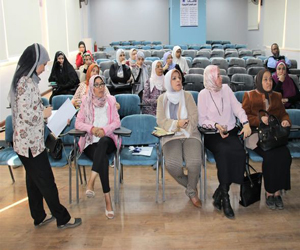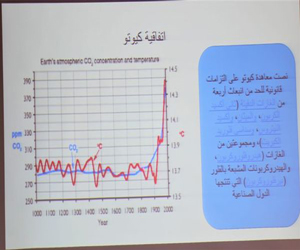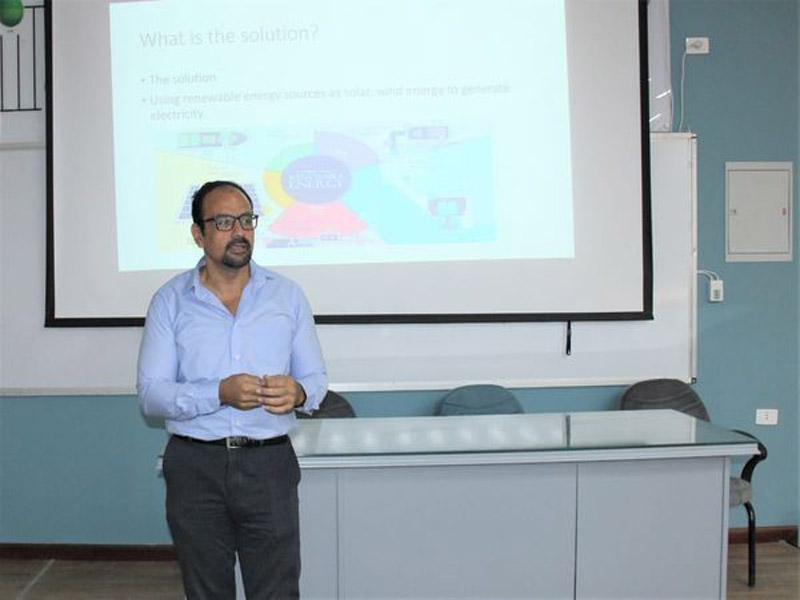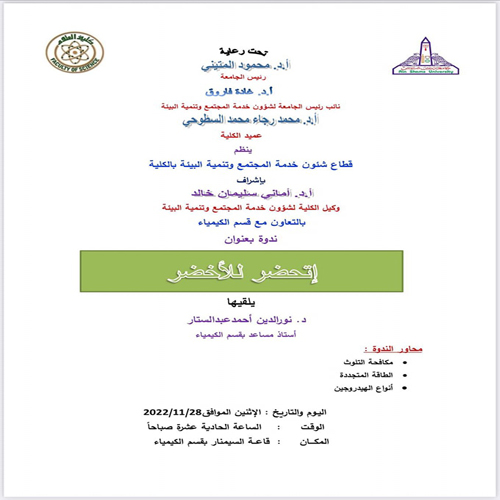"Go Green" symposium at the Faculty of Science
The Community Service Affairs and Environmental Development Sector at the Faculty of Science at Ain Shams University organized a symposium entitled "Prepare for Green" under the auspices of Prof. Dr. Mahmoud El-Meteini, President of Ain Shams University, Prof. Dr. Ghada Farouk, Acting Vice President for Community Service and Environmental Development, Prof. Dr. Muhammad Rajaa Al-Satohi, Dean of the Faculty of Science at the university, under the supervision and presence of Prof. Dr. Amani Suleiman, Vice Dean for Community Service and Environmental Development.
Dr. Noureldine Ahmed Abdel Sattar, Assistant Professor, Department of Chemistry, gave a lecture at the seminar in the presence of a group of faculty staff, students, and those interested in climate change issues.
During the seminar, Dr. Noureldine confirmed that scientists have noticed a rise in average temperatures in the last 140 years, pointing out that a number of measures must be taken to address carbon dioxide emissions and greenhouse gases.
 |
 |
 |
||
He explained the phenomenon of global warming as the increase in the planet's temperature due to the high level of carbon dioxide, methane, and some other gases in the atmosphere, which are called "greenhouse gases".
He reviewed the provisions of the Kyoto Agreement and the legal obligations stipulated therein to reduce emissions of greenhouse gases such as carbon dioxide and methane, which cause the effect of the greenhouse or "global warming" on the planet, in which greenhouse gases play a major role.
Referring to the effects of high temperatures on the environment, including creatures such as insects and plants, in addition to its effect on humans, the melting of the ice of the North and South poles, and thus the rise in sea levels, which may lead to the sinking of the coasts of Miami, Shanghai, and Alexandria.
Dr. Noureldine suggested solutions for high temperatures and high greenhouse gases, such as the use of renewable energies such as solar energy, wind energy, hydroelectric energy, and the use of various types of hydrogen in industries that need high temperatures.
Dr. Noureldine explained the sources of obtaining the various types of hydrogen and the differences between these types.
He emphasized that Egypt is one of the best areas where solar energy can be generated, and he mentioned the city (Benban), where Egyptian experts have already begun to generate solar energy.
Dr. Noureldine, at the conclusion of the symposium, urged researchers and specialists in the fields of environment and industry that they should increase research in the fields of renewable and alternative energy and research related to the transfer of renewable fuels (such as solar energy - green hydrogen) and clean and marketing it.



.svg)




